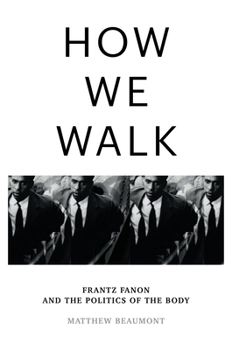How We Walk: Frantz Fanon and the Politics of the Body
"In this fascinating and wide-ranging book, Beaumont reminds us that walking is far from a neutral activity. With the help of Frantz Fanon, Beaumont locates freedom at the level of the body; free from the systems of oppression, exploitation, and harassment."
-Lauren Elkin, author of Fl neuse How race, class, and politics influence the way we move
You can tell a lot about people by how they walk. Matthew Beaumont argues that our standing, walking body holds the social traumas of history and its racialized inequalities. Our posture and gait reflect our social and political experiences as we navigate the city under capitalism. Through a series of dialogues with thinkers and walkers, his book explores the relationship between freedom and the human body How We Walk foregrounds the work of Frantz Fanon, psychiatrist and leading thinker of liberation, who was one of the first people to think about the politics of 'walking while black'. It also introduces us to the renegade psychoanalyst Wilhelm Reich, who wrote that one could discern the truth about a person through their posture and gait. For Marxist philosopher Ernst Bloch, the ability to walk upright and with ease is a sign of personal and social freedom. Through these excursions, Beaumont reimagines the canonical literature on walking and presents a new interpretation of the impact of class and race on our physical and political mobility, raising important questions about the politics of the body.
-Lauren Elkin, author of Fl neuse How race, class, and politics influence the way we move
You can tell a lot about people by how they walk. Matthew Beaumont argues that our standing, walking body holds the social traumas of history and its racialized inequalities. Our posture and gait reflect our social and political experiences as we navigate the city under capitalism. Through a series of dialogues with thinkers and walkers, his book explores the relationship between freedom and the human body How We Walk foregrounds the work of Frantz Fanon, psychiatrist and leading thinker of liberation, who was one of the first people to think about the politics of 'walking while black'. It also introduces us to the renegade psychoanalyst Wilhelm Reich, who wrote that one could discern the truth about a person through their posture and gait. For Marxist philosopher Ernst Bloch, the ability to walk upright and with ease is a sign of personal and social freedom. Through these excursions, Beaumont reimagines the canonical literature on walking and presents a new interpretation of the impact of class and race on our physical and political mobility, raising important questions about the politics of the body.
Format:Hardcover
Language:English
ISBN:1804290076
ISBN13:9781804290071
Release Date:March 2024
Publisher:Verso
Length:224 Pages
Weight:0.60 lbs.
Dimensions:0.9" x 5.8" x 8.4"
Customer Reviews
0 rating





